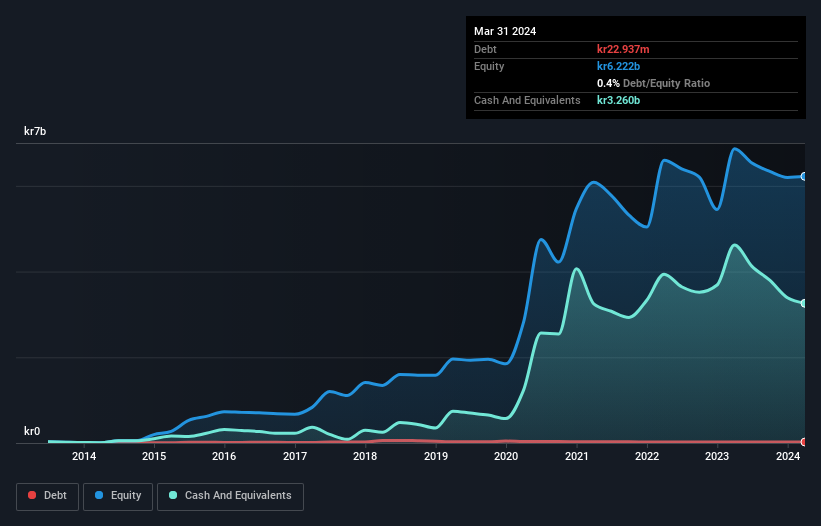David Iben put it well when he said, 'Volatility is not a risk we care about. What we care about is avoiding the permanent loss of capital.' So it seems the smart money knows that debt - which is usually involved in bankruptcies - is a very important factor, when you assess how risky a company is. Importantly, Nel ASA (OB:NEL) does carry debt. But the more important question is: how much risk is that debt creating?
Why Does Debt Bring Risk?
Debt and other liabilities become risky for a business when it cannot easily fulfill those obligations, either with free cash flow or by raising capital at an attractive price. In the worst case scenario, a company can go bankrupt if it cannot pay its creditors. However, a more common (but still painful) scenario is that it has to raise new equity capital at a low price, thus permanently diluting shareholders. Of course, the upside of debt is that it often represents cheap capital, especially when it replaces dilution in a company with the ability to reinvest at high rates of return. When we examine debt levels, we first consider both cash and debt levels, together.
Check out our latest analysis for Nel
What Is Nel's Debt?
As you can see below, Nel had kr22.9m of debt at March 2024, down from kr24.0m a year prior. However, its balance sheet shows it holds kr3.26b in cash, so it actually has kr3.24b net cash.

How Strong Is Nel's Balance Sheet?
The latest balance sheet data shows that Nel had liabilities of kr1.19b due within a year, and liabilities of kr336.1m falling due after that. Offsetting these obligations, it had cash of kr3.26b as well as receivables valued at kr704.0m due within 12 months. So it can boast kr2.44b more liquid assets than total liabilities.
This excess liquidity suggests that Nel is taking a careful approach to debt. Due to its strong net asset position, it is not likely to face issues with its lenders. Simply put, the fact that Nel has more cash than debt is arguably a good indication that it can manage its debt safely. There's no doubt that we learn most about debt from the balance sheet. But ultimately the future profitability of the business will decide if Nel can strengthen its balance sheet over time. So if you're focused on the future you can check out this free report showing analyst profit forecasts.
Over 12 months, Nel reported revenue of kr1.7b, which is a gain of 61%, although it did not report any earnings before interest and tax. With any luck the company will be able to grow its way to profitability.
So How Risky Is Nel?
Statistically speaking companies that lose money are riskier than those that make money. And in the last year Nel had an earnings before interest and tax (EBIT) loss, truth be told. Indeed, in that time it burnt through kr1.5b of cash and made a loss of kr685m. However, it has net cash of kr3.24b, so it has a bit of time before it will need more capital. Nel's revenue growth shone bright over the last year, so it may well be in a position to turn a profit in due course. By investing before those profits, shareholders take on more risk in the hope of bigger rewards. The balance sheet is clearly the area to focus on when you are analysing debt. But ultimately, every company can contain risks that exist outside of the balance sheet. For example - Nel has 2 warning signs we think you should be aware of.
At the end of the day, it's often better to focus on companies that are free from net debt. You can access our special list of such companies (all with a track record of profit growth). It's free.
Valuation is complex, but we're here to simplify it.
Discover if Nel might be undervalued or overvalued with our detailed analysis, featuring fair value estimates, potential risks, dividends, insider trades, and its financial condition.
Access Free AnalysisHave feedback on this article? Concerned about the content? Get in touch with us directly. Alternatively, email editorial-team (at) simplywallst.com.
This article by Simply Wall St is general in nature. We provide commentary based on historical data and analyst forecasts only using an unbiased methodology and our articles are not intended to be financial advice. It does not constitute a recommendation to buy or sell any stock, and does not take account of your objectives, or your financial situation. We aim to bring you long-term focused analysis driven by fundamental data. Note that our analysis may not factor in the latest price-sensitive company announcements or qualitative material. Simply Wall St has no position in any stocks mentioned.
About OB:NEL
Nel
A hydrogen company, provides solutions to produce, store, and distribute hydrogen from renewable energy in Norway and internationally.
Flawless balance sheet with very low risk.
Similar Companies
Market Insights
Community Narratives



